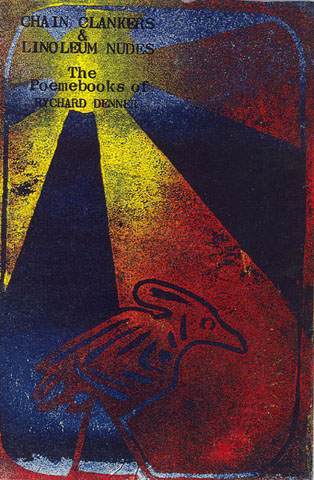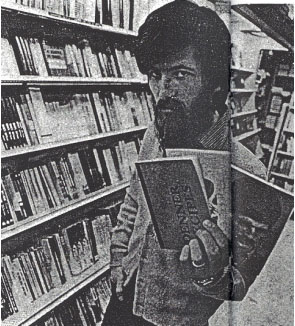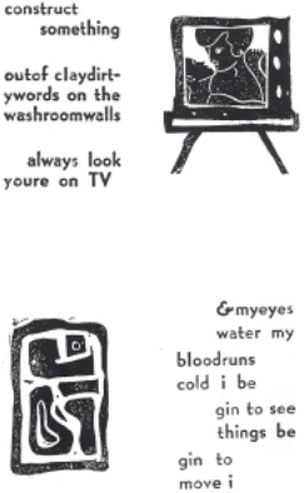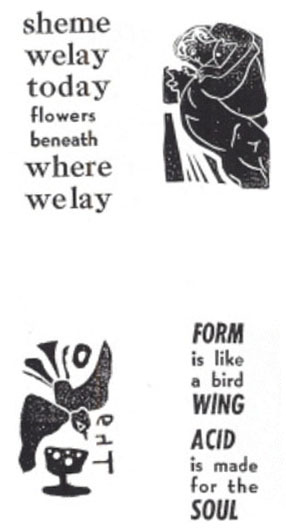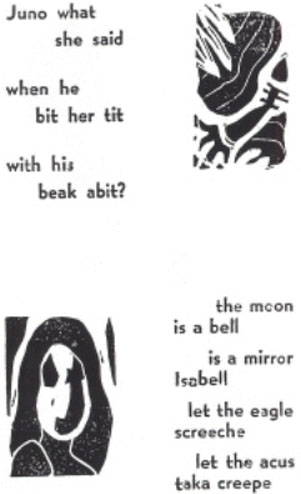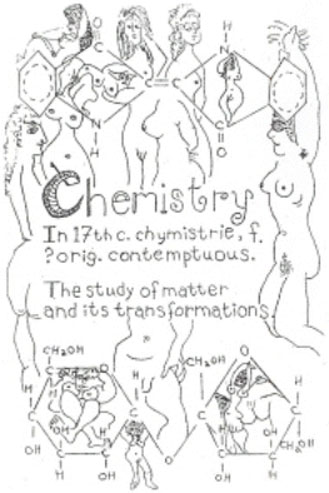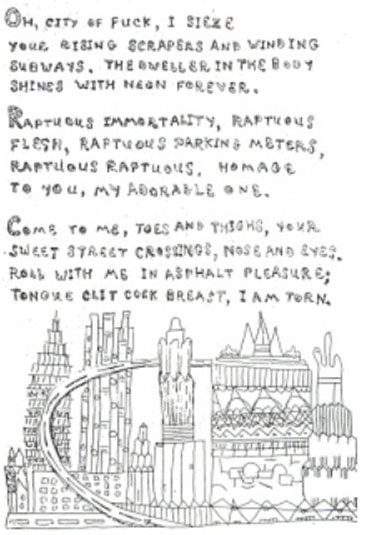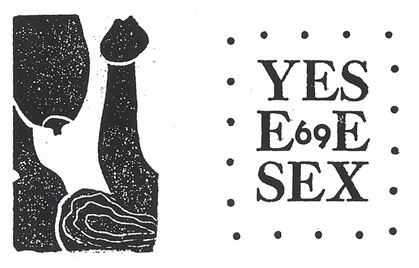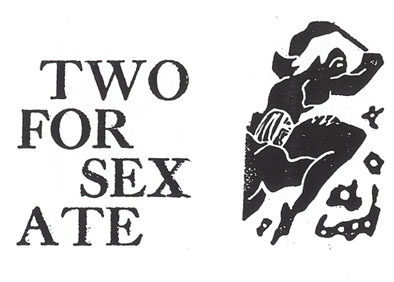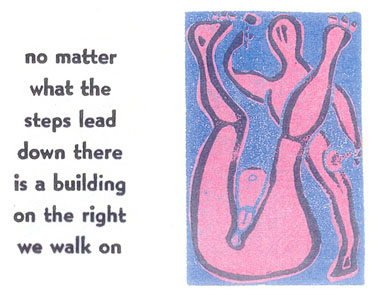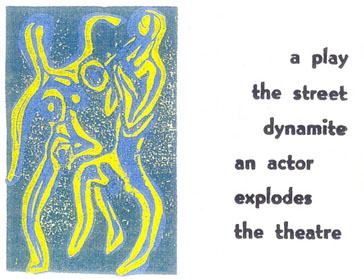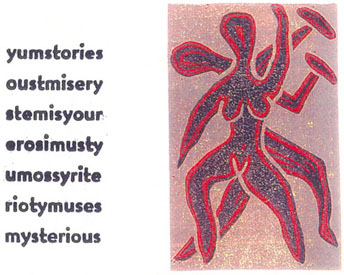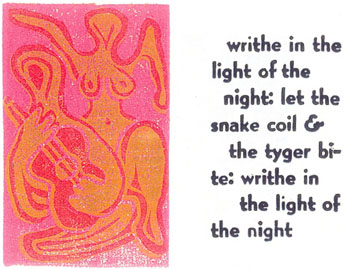CHAINCLANKERS
& LINOLEUM NUDESD PRESS 1998 SEBASTOPOL
COVER ART BY GRANT RISDON
Preface
The poems included in this selection comprise a series of chapbooks that were the inaugural publications of D Press. I began D Press in an attic apartment in 1967 in Ketchikan, Alaska, after I found an abandoned Kelsey "Excelsior" handpress and several fonts of worn type and hauled the lot away for $50.
Days, I worked in the backshop of the Ketchikan Daily News doing layout, burning plates, and assisting run a 3-unit Goss "Community" webpress. At night, I set type and hung my prints to dry on lines nailed to the angle of the roof. Grant Risdon showed me how to cut linoleum blocks, and this enabled me to disguise some of the irregularities in my printing and to add a dash of color to compliment the big, bold words showing through with all their weight. Given a 4 x 6 inch type case, how much poem can be printed with 60 point Bodoni Bold?!
My first books, POEMS & BLOCKS and AZTEC DESIGNS, were illustrated by Grant Risdon. These and EYE OF THE VITAMIN were completed before I moved with my family to a cabin on the shore of a cove across Moser Lake from Deep Bay. Poembooks continued to emerge, among them OH NO POEM by Kelly Boen.
In 1970, after two long winters in the Tongass National Forest, we drove the Alkan Highway to Fairbanks. I learned etching and a multi-color block print technique at the University of Alaska from Terrance Choy. The content of my work created some controversy when I approached the campus bookstore to sell my books. The Polar Star newspaper article by Barbara Rhines, here reprinted, act as an introduction to my poems from this period.
I wish to thank all my friends, my parents, and my teachers who helped me during these years, especially my in-laws, John and Karen Bader, and my parents, my son Theo, and my ex-wife, Cheri Elizabeth. Thank you for the comfort, support and encouragement. Thank you for the companionship and love.
Poetry
Books raise censorship question
by Barbara RhinesThe question of who has the right to decide what UA students may read has arisen with the censoring of a book of poetry from the university bookstore.
"In Rosth vs. United States; 354 S 476 (1957) 'obscenity' was defined by Mr. Justice Brennan as that which was 'utterly without redeeming social importance.' What did Brennan intend by 'obscenity?' Material 'which deals with sex in a manner appealing to pruient interests.'" -- Censorship Landmarks, Edward DeGrazia 1969The book, written, illustrated and printed by student Richard Denner, was termed "unsuitable" by William Hogan, manager of Business Service, and omitted from bookstore shelves.
Hogan is the superior of Leroy Rich, manager of the UA bookstore. "I thought it was obscene," Hogan stated.
Denner had originally agreed to provide six books for sale in the bookstore. Upon receiving the books, Rich was concerned that one of the books would be considered pornographic.
After consulting his superior, the decision was made to "omit" the book. 'The rest of the books were to be kept under the counter and sold only if asked for specifically.
At the same time, English instructor John Hulbert presented copies of the books to the library. In a letter which accompanied the books, Hulbert wrote, "My own opinion is that he (Denner) is a sincere and talented artist, and that as he grows the university will be glad to have collected his early attempts at writing and printing."
Hulbert also wrote, "I'll be using several of his things during this term as reference material. (Hulbert was referring to a graduate writers' workshop.)
The library accepted the books. Director Ted Ryberg said, "Our function is to present both sides of all topics and let our patrons make up their own minds. We don't have a position on any topic. We are to support the curriculum."
When Rich and Hogan were informed of the library's decision, the books were classified as text books and, supposedly, put behind the counter. The "black sheep" of the lot was included, making the total again six.
Rich said, "The bookstore and the library should have the same policy about books. I'm not going to buck the library."
In an attempt to explain the original censorship, or "selection" as Hogan prefers, he offered the following statement: 1) "Because of faculty children we are compelled to censor; 2) The fact that we don't carry it in the bookstore doesn't mean we are denying it…we're pressured for space anyway. We don't carry every book that has ever been published; and 3) I think it's reasonable that material other than texts should be judged."
Hogan suggested that because the books had been printed by hand and were made by a student that they had attracted undue attention. "If this was intended to throw sand in the machine, it has done it," he said.
Hulbert commented, "It wasn't meant to bother anybody and I'm surprised that it has. A lot more graphic and bothersome things have been classics for the last 15 years."
Terrance Choy, professor of art, said, "I'm an artist, not a poet, and I think the books have artistic merit. Richard shows a proficiency in dealing with woodcuts."
Choy was concerned that there were no rules or an official definition of censorship for the university. "Pornography exists in the mind of the beholder. Any person who is offended by it can ignore it," he stated.
Director of Student Activities, Don Scott said, "It's not that the books are great, or really bad…it's just because they are different."
Lyle Harris, associate professor of journalism was refused the opportunity to see the books while they were being kept under the counter.
Harris stated, "I went over to the bookstore and asked to see "Poembooks." The girl clerk said she didn't know where they were. I asked her to find out, and she looked around the store for several minutes. She returned and said she couldn't find them. I asked her to find out why they weren't around. After a conference in the back she returned and told me that the books were unfit to be sold by the manager. She said the manager was out of town."
Harris commented, "I think the whole thing was utterly ridiculous to advertise a book and then pull it off the shelf because it offends one person's standards."
Assistant professor of journalism, Don Wright, who was with Harris when the incident occurred, commented, "I'm against any form of censorship." He also brought up the age-old, "Who shall judge the judges?"
Author-artist Denner said, "I'm upset that people have no sense of humor about the whole situation. I wanted them to be received with a sense of humor."
Denner said the uproar "aroused a bewildered feeling." "The works will endure no matter how much they are criticized," he commented.
Asked if he was angry, Denner replied, "About the only thing that would make me angry is if someone should destroy them."
The books are now on the poetry shelf, accessible to the general public, but the vital question of the authority of UA employees and administrators to censor or "select" student reading material remains.
Quipped Ryberg, "A little bit of censorship is like a little bit of pregnancy…it just ain't."
